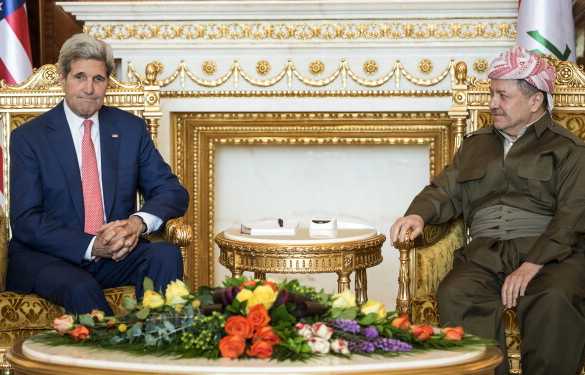A window of opportunity for Kurdish ambitions in northern Iraq is now open. The Kurdish Regional Government (KRG) has been methodically laying the groundwork for sovereignty in their semi-autonomous enclave over the last decade, waiting for the right moment to secede from Baghdad. The presidency of Donald Trump and the defeat of the Islamic State may finally be ushering in the circumstances they need for independence.
In the nearly three years since Islamic State forces swept through northern Iraq, the KRG has established a de facto state. It has a constitution, and the bureaucracy in its capital, Erbil, has its own functioning ministries. The Kurdish military force, the Peshmerga, is increasingly well-armed and battle-tested. Thanks to warm relations with Turkey, the KRG is exporting oil through Turkish ports, bypassing Baghdad. Although the Turkish government’s recent crackdown on Kurdish groups within Turkey has strained relations with the KRG, trade agreements keep diplomatic affairs amicable.
One of the Iraqi Kurds’ few remaining obstacles to independence is the US government’s “One Iraq” policy. This position, which emerged after the 2003 invasion of Iraq, holds that the best way forward for Iraq is to remain as a single state. Despite countless entreaties from Kurdish leaders to alter this position, the Obama administration held fast to the idea of a “united, federal, and democratic Iraq.”
For the Kurds, this policy is a non-starter for their national aspirations. The decreasing price of oil has left the KRG insolvent and dependent on US financial backing, and US military aid is necessary to maintain security. Perhaps more importantly, US diplomatic support will be needed for the Kurds to resolve thorny issues with Baghdad, such as the status of the disputed, oil-rich city of Kirkuk. If the divorce between Baghdad and Erbil is to be peaceful, the US may need to act as a broker between the two parties.
The arrival of President Trump to the White House may bring about the policy shift that the KRG needs. The new president has demonstrated a willingness to toss aside long-standing tenets of American foreign policy with regard to the Middle East. Most recently, Trump has vowed to move the US embassy in Israel from Tel Aviv to Jerusalem, which Israel claims as its capital but is unrecognized as such by other countries. Perhaps more relevant for the Kurds is Trump’s December 2, 2016 phone conversation with the president of Taiwan. This challenged the United States’ long-held “One China” policy by suggesting that Trump considers Taiwan to be an independent state. Reporting has indicated that the exchange with the Taiwanese leadership was “intentionally provocative” and a deliberate “break from the past.” If Trump is willing to shake up the “One China” policy, then perhaps the “One Iraq” policy will be altered, too.
On the campaign trail, Trump spoke highly of the Kurdish people, extolling their battlefield courage against the Islamic State and noting their military contributions. “We should be arming the Kurdish[sic]; they’ve proven to be the best fighters,” said Trump. “They’ve proven to be the most loyal to us … we should be using and utilizing those people – they have great heart, they’re great fighters, and we should be working with them much more so than we’re working.” It’s been noted that Trump seems to abide by a transactional style of leadership. Given the efforts the Kurds have put in against ISIS, and the high regard in which Trump holds them, it seems logical to conclude that new leadership would soften the “One Iraq” policy espoused by previous White House administrations. This is something the Kurds should capitalize on.
The Islamic State’s recent loss of eastern Mosul to the combined Iraqi and Kurdish offensive brings the region closer to an inflection point. Kurdish officials have been explicit that they have no intention to return to the status quo ante. Aziz Ahmed, a KRG official, wrote in Foreign Policy: “For the Kurds, this isn’t just a fight against IS but a war of independence, and Baghdad should not expect them to simply return to a united Iraq.” In another piece he stated the position more bluntly: “We will not return to a united Iraq if Mosul is liberated.” Karwan Zebari, the director of political and diplomatic affairs with the KRG Mission in Washington, D.C., told the Journal of Middle Eastern Politics and Policy that KRG President Masoud Barzani “wants to declare Kurdistan a state” before he leaves office. He added that, “this is a movement that his father [former Kurdish leader Mustafa Barzani] started … he wants to at least put the pieces in motion before he leaves” office in 2017.
With Trump in office and the campaign in Mosul inching closer to completion, this may be the moment Barzani has waited for. With the US president apparently willing to upend long-established foreign policy, a Kurdish bid for independence may finally meet with American support. Barzani would be wise to declare statehood soon, because it is unclear when a more opportune moment will occur.
